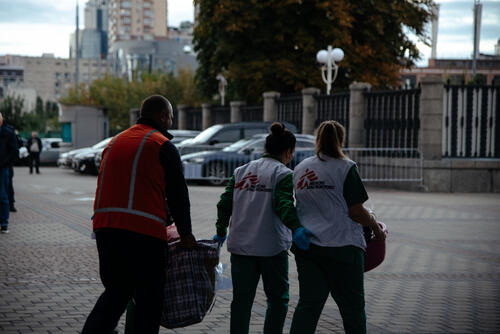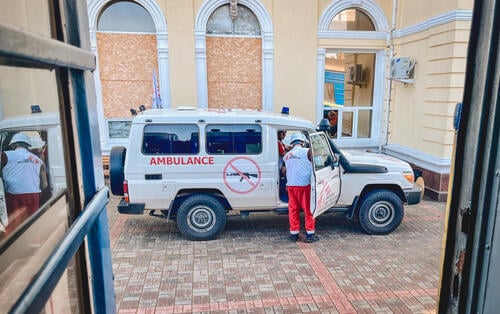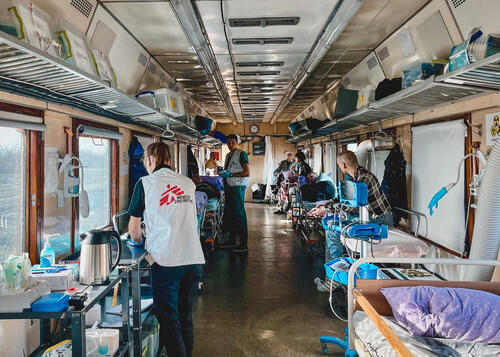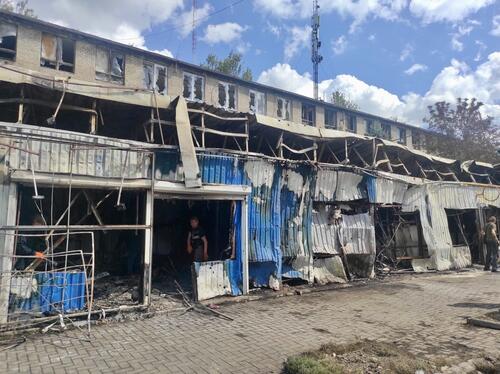After a year of emergency response in the Kharkiv region, Ukraine, Médecins Sans Frontières (MSF) teams have continued to support displaced people and those without access to healthcare, as well as reconstructing healthcare facilities, training healthcare staff and providing medical donations to hospitals.
As the war in Ukraine escalated in February 2022, many residents of Kharkiv fled to the west or left the country entirely. Meanwhile, other people from rural villages and towns fled directly to the city, finding shelter in its underground metro stations.
The healthcare system soon became overburdened. Many healthcare staff left the region to seek safety, while medical needs only increased due to the the war. In response, our emergency teams began supporting healthcare facilities with donations as well as providing medical consultations to displaced people in Kharkiv city.
March 2022 - March 2023, MSF teams in Kharkiv provided:
11,000
11,
2,000
2,
700
7
Many people who took refuge in the metro stations of the city were coping with the loss of family members and friends, losing their homes and the futures they had planned for themselves. MSF teams set up mobile clinics to provide people with psychological first aid.
At that time, most of the humanitarian aid response in Ukraine was provided by local NGOs, civil society groups and Ukrainian volunteer groups. As our teams couldn't reach all those cut off from aid, we resorted to providing donations, such as fuel, food boxes and hygiene kits, to volunteer groups to support those most in need. Partnering with groups and individuals allowed our teams to reach far more people than would have been otherwise possible.
Reaching areas cut off from healthcare
In early September, as the Ukrainian army retook vast areas of the Kharkiv region, MSF teams ran mobile clinics in areas now under Ukrainian control to reach people who had often been cut from aid for months. Often, our teams were the first to meet people who had been in isolation in the villages and towns of Kharkiv region.
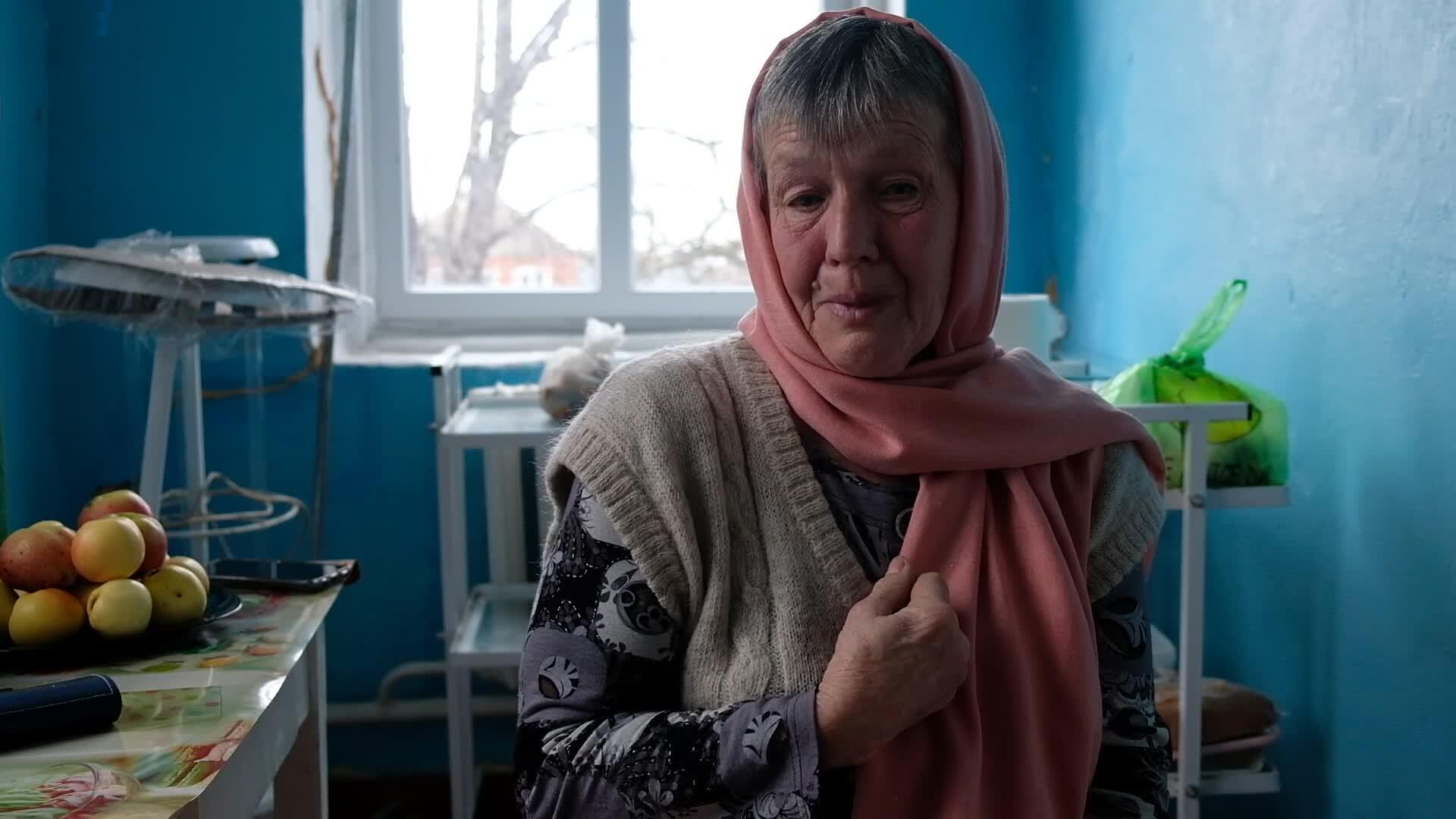
A year of providing healthcare in Kharkiv
“We saw that near the frontlines, access to healthcare was almost non-existent,” says Natalia Torrent Martinez, MSF Head of Mission in Ukraine. “When we arrived at these retaken areas, we tried to identify how the provision of healthcare had operated in the past. Our aim was to support the healthcare system, so it could get back up and running, while providing psychological first aid and basic healthcare to those most in need.”
Being able to work in areas close to the frontlines was an essential part of supporting people who had remained in these areas.
“People lived for months isolated and excluded from the outside world. Imagine that suddenly a group of people show up in your village, to bear witness to your suffering and to support you,” says Martinez. “The mere presence of our teams meant a lot to people who, in some cases, had endured the worst year of their lives.”
People lived for months isolated and excluded from the outside world. The mere presence of our teams meant a lot to people who, in some cases, had endured the worst year of their lives.Natalia Torrent Martinez, MSF Head of Mission in Ukraine
In most of the villages and towns where our teams worked in, the healthcare staff had left, health facilities had been destroyed or looted, and people couldn’t get the medicine they needed for new or chronic conditions. Our teams set up clinics in streets, at bus stops or in the town halls – frequently with the help of the residents themselves. In some cases, residents even opened their homes to allow MSF teams to set up temporary clinics there.
The mental health impact of the war
Many patients are struggling, not only with the loss of family members and neighbours, but also with the loss of the life they knew. Most of the patients our teams have supported in the past year are over the age of 60. As the fighting persists in many of these villages and towns near the frontlines, it continues to take a heavy toll on people’s mental health.
“Many of the people we have met are retired and after years of building what they have, suddenly their lives have been completely turned upside down,” says Martinez.
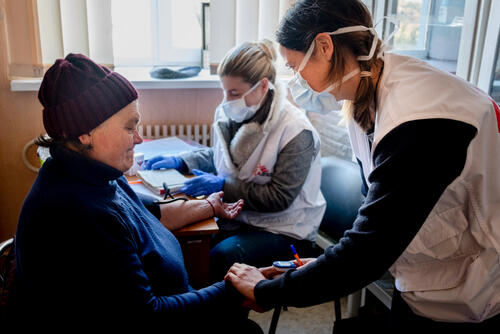
“Many of the people we have met are retired and after years of building what they have, suddenly their lives have been completely turned upside down,” says Martinez.
The impact of the war on people’s mental health is and will continue to be one the main challenges for the healthcare system in Ukraine, as the needs have grown immensely. At the same time, stigma surrounding mental health has decreased and mental health support has become normalised.
Although new organisations have come to Kharkiv and the local healthcare system is slowly regaining its capacity, the people living in the region – especially close to the frontlines – continue to endure hardship and challenges in accessing healthcare. We continue to reshape our approach in the Kharkiv region, where our teams monitor the situation and intervene where needed, including in the neighbouring region of Poltava, which hosts large numbers of displaced people.



